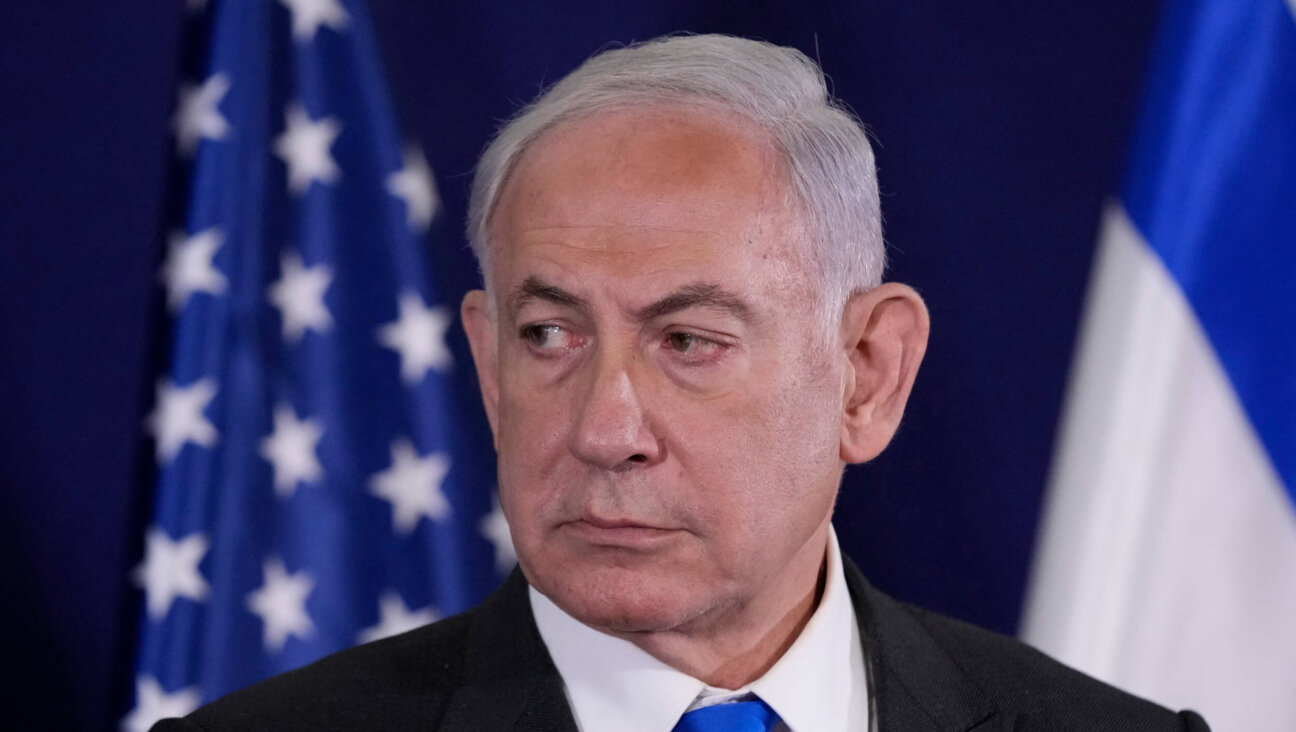The White House Campaign of Lies That Wrecked the Middle East — No, It Wasn’t Ben Rhodes

Image by Getty Images
America’s political polarization affects us all in such strange and profound ways that sometimes we don’t even know it’s there.
We’re all familiar with those debates that never go anywhere because the two sides are arguing from different sets of facts. Climate change, for example. Sometimes, though, we’re living in solitudes so utterly separate that one side can be arguing furiously with the other, and the other side won’t even know there’s an argument going on.
Case in point: the uproar over that lengthy profile of White House aide Ben Rhodes that appeared in the New York Times Magazine on May 8 (and on the Times website May 5). If you live inside the left’s echo chamber, it’s a scandal that came and went. Rhodes, the president’s deputy national security adviser for strategic communications, foolishly shot his mouth off, as liberals see it, to a seemingly friendly journalist about how cleverly he sold the Iran nuclear deal to Congress and the public. The Times, for its part, stupidly published what amounted to a 9,500-word hit piece masquerading as serious journalism (and, incidentally, touting Rhodes’s PR skills without mentioning that he never actually managed to win majority support either in Congress or the public). The liberal commentariat duly weighed in with predictable passion. Replies to the critics were promptly issued by Rhodes and by the profile’s author, freelancer David Samuels. And that was about it. Yesterday’s news.
Inside conservative-world, though, the article landed like a bombshell, and the ground hasn’t stopped shaking. Rhodes, who’s depicted as so close to the president that they communicate by “mind meld,” seemed to be confessing to Samuels that the entire hated Iran deal rested on falsehoods. The right finally had its smoking gun, discrediting the Iran deal as a fraud.
“The way in which most Americans have heard the story of the Iran deal presented,” Samuels wrote, was that “the Obama administration began seriously engaging with Iranian officials in 2013,” taking advantage of new Iranian elections that “brought moderates to power” under incoming president Hassan Rouhani.
In fact, though, Samuels wrote, the administration’s story “was largely manufactured for the purpose for selling the deal. The “particulars may have been true, but the implications that readers and viewers are encouraged to take away from those particulars are often misleading or false.”
The truth, Samuels wrote, was that Obama and company never genuinely believed Rouhani was a genuine moderate — “we aren’t betting on that,” Rhodes is quoted as saying — but called him that anyway. Besides, the U.S.-Iranian talks actually began secretly a year earlier, in 2012, when Iran’s president was still the unhinged Mahmoud Ahmedinejad.
Samuels went on to write that the Obama administration’s ultimate goal in crafting the Iran deal was “to eliminate a source of structural tension between the two countries, which would create the space for America to disentangle itself from its established system of alliances with countries like Saudi Arabia, Egypt, Israel and Turkey.” This has been widely interpreted as something Samuels learned from Rhodes, though in fact it’s a common anti-Obama myth that Samuels inserted in his own words. In fact Obama stated throughout his 2008 presidential campaign that he was committed to preventing the terror-sponsoring regime from acquiring nuclear weapons and hoped to accomplish that through negotiations if possible. The United Nations Security Council had been piling sanctions on Iran since 2006 as punishment for its illegitimate nuclear program, and the regime had been negotiating on and off with a trio of Britain, France and Germany. Toward the end of the Bush administration hey were joined by the other permanent members of the Security Council: Russia, China and, in the twilight of the Bush administration, the United States. Thus was born the P5+1, the five permanent members plus Germany.
In 2012 Obama entered a secret back-channel negotiation with Iran, mediated by Oman, to see whether one-on-one talks might succeed where the round-table jawboning hadn’t. Those talks didn’t get serious until Rouhani came into office in August 2013 with his platform of improving ties with the West. Hence the notion that Rouhani’s relative moderation made negotiations possible. But Washington’s goal in the negotiations, under Bush and Obama alike, was to reach an agreement that was verifiable and enforceable regardless of who ruled in Tehran. They weren’t “betting” on moderates.
But Samuels wrote what Samuels wrote.
The right-wing press eruptedin righteous outrage when Samuels’s article appeared, and hasn’t stopped. Rhodes, it was said, had supplied the evidence that the Iran deal was not just misguided but deliberately so. Congressional Republicans have swung into action with demands that Rhodes be fired or summoned to testify at the hearings that are already in the works. There’s even talk of cutting budgets in order to force the downsizing of the National Security Council, where Rhodes works.
This is where our tale enters the Twilight Zone. One of the first congressional panels to schedule an inquiry on the Rhodes affair was the House Committee on Oversight and Government Reform, chaired by Utah Republican Jason Chaffetz, which scheduled a May 17 hearing on “White House narratives on the Iran nuclear deal.” And one of the first witnesses invited to testify was John Hannah, onetime national security adviser to Vice President Dick Cheney, currently senior counselor at the Foundation for Defense of Democracies, a neoconservative think tank.
Hannah should know a thing or two about fabricating narratives to justify Middle East policy initiatives. In 2002, while serving in Cheney’s office in the Bush White House, he played a key role in assembling the false intelligence that helped build the case for the American invasion of Iraq in 2003. In particular, he was one of the key administration contacts with Ahmed Chalabi, the head of the Iraqi National Congress, who fed Washington much of the hyped-up information about Saddam Hussein’s imaginary weapons of mass destruction. Chalabi, a wealthy Shi’ite who died in 2015, had spent a decade cultivating neoconservatives to lobby for an invasion and pushing the case that the Iraqi people were eager to welcome the Americans and ready to establish a peaceful, pro-Western democracy.
The Iraq experience could provide a useful lesson to lawmakers about how an administration can build a misguided policy on a foundation of lies, in the unlikely event that they’re interested in learning it. A great deal has been written and said about the weapons of mass destruction that weren’t there and the inability of the Iraqi people to settle into a peaceful, functioning democracy, then or now. The commonly accepted narrative, even by liberals, is that the Bush administration was misled by faulty intelligence indicating that Saddam had a nuclear program hidden away.
But the full story is rarely told, even though much of it has been publicly laid out in various places. For starters, George W. Bush’s first Treasury secretary, Paul O’Neill, described in journalist Ron Suskind’s 2004 book “The Price of Loyalty” how the planning for the overthrow of Saddam was launched on Bush’s instructions at the first meeting of the newly elected president’s National Security Council on January 30, 2001, 10 days after he was inaugurated — and seven months before the September 11 attacks.
Richard Clarke, NSC counter-terrorism chief in both the Clinton and Bush administrations, described in his own 2004 book, “Against All Enemies,” how Bush approached him on September 12, 2001, and told him to find evidence that Saddam was linked to the previous day’s atrocities, even though Clarke already knew they’d been planned by Al Qaeda and had nothing to do with Saddam — and told Bush so.
And Uzi Dayan, director of Israel’s national security council under then-prime minister Ariel Sharon, told me in a 2006 interview that he was told by then-NSC chief Condoleezza Rice at a meeting in early January 2002 that “the president has already decided” to invade Iraq — even though the administration spent another 14 months claiming it was open to other measures, looking for evidence of those weapons, consulting with allies and pretending to hope that Saddam would “come clean” about his non-existent weapons program.
The Bush administration was not the first administration in recent history to build a disastrous foreign policy initiative on a foundation of outright lies. The Reagan administration memorably waged a war against the Sandinista government of Nicaragua during the 1980s, even though that war had been specifically outlawed by Congress, and financed the war by illegally selling weapons to the Islamic Republic of Iran. The exposure of the doubly illegal secret program led to the conviction of several top Reagan aides on charges of lying to Congress, but Reagan himself emerged with his reputation intact and his place in history assured, at least in the minds of Republicans, as one of our great presidents.
The consequences of Bush’s Iraq invasion were far more profound and long-lasting. As Israel’s Sharon correctly warned Bush in a White House meeting in February 2002, after being alerted to the president’s plans by Dayan, an Iraq invasion would have the effect of fracturing Iraq into warring tribes of Sunnis, Shi’ites and Kurds and drag America into a long-lasting and probably unwinnable quagmire. It would also, in eliminating Saddam Hussein, liberate Iran from its worst enemy and thus free up the Islamic Republic to become a regional superpower. In the bargain it would turn Sunni-led Iraq from Iran’s worst enemy into a Shi’ite-ruled client state, though Sharon apparently didn’t bring that up in the conversation.
Sharon couldn’t know or predict a fourth result of the American invasion: drawing a young Jordanian-born terrorist named Abu Musab al-Zarqawi into the chaotic post-invasion Iraq where he launched a Sunni insurgency under the banner of an organization he created — an organization that eventually, shortly after Zarqawi’s 2006 death, took the name Islamic State in Iraq and then changed it again in 2013 to the Islamic State in Iraq and Syria, or ISIS.
The Republicans in Congress seem determined to accuse the Obama administration of something that it didn’t do, but the two most recent two-term Republican administrations most assuredly did: pursuing a misguided policy under a cover of lies that greatly benefited Iran. Even more strange, they’re basing their accusation on a misleadingly-written story in a newspaper they usually hate and mistrust, the New York Times.
It’s a curious display of historical amnesia. Perhaps it’s a case of psychological projection. Either way, it certainly shows how different are the realities in which different groups of Americans live.

I hope you appreciated this article. Before you go, I’d like to ask you to please support the Forward’s award-winning journalism this Passover.
In this age of misinformation, our work is needed like never before. We report on the news that matters most to American Jews, driven by truth, not ideology.
At a time when newsrooms are closing or cutting back, the Forward has removed its paywall. That means for the first time in our 126-year history, Forward journalism is free to everyone, everywhere. With an ongoing war, rising antisemitism, and a flood of disinformation that may affect the upcoming election, we believe that free and open access to Jewish journalism is imperative.
Readers like you make it all possible. Right now, we’re in the middle of our Passover Pledge Drive and we need 500 people to step up and make a gift to sustain our trustworthy, independent journalism.
Make a gift of any size and become a Forward member today. You’ll support our mission to tell the American Jewish story fully and fairly.
— Rachel Fishman Feddersen, Publisher and CEO
Join our mission to tell the Jewish story fully and fairly.
Our Goal: 500 gifts during our Passover Pledge Drive!
























